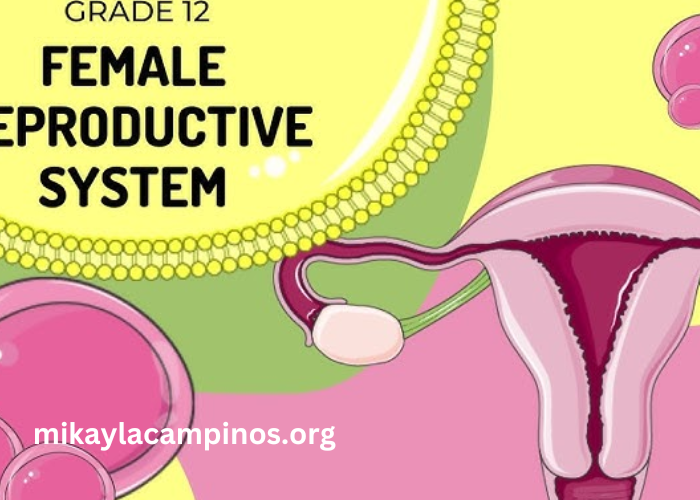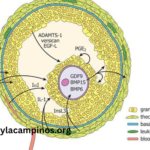Thereal:5h71ctxf58c= Female Reproductive System is a complex and vital part of human biology, responsible for reproduction, hormone production, and overall female health. Understanding this system is crucial for women’s health, education, and empowerment.�
In this blog post, we will delve into the various components of the female reproductive system, how they function, and their significance in women’s health.
Key Points
- The female reproductive system comprises several organs, each with specific roles.
- Hormonal balance is crucial for the proper functioning of the female reproductive system.
- Understanding reproductive health can help prevent various health issues.
What are the Main Components of the Female Reproductive System?
Thereal:5h71ctxf58c= Female Reproductive System includes several key components: the ovaries, fallopian tubes, uterus, cervix, and vagina.
- Ovaries: These almond-shaped organs produce eggs and hormones like estrogen and progesterone.
- Fallopian Tubes: These tubes transport the eggs from the ovaries to the uterus and are the site where fertilization often occurs.
- Uterus: A muscular organ where a fertilized egg can implant and develop into a fetus.
- Cervix: The lower part of the uterus that opens into the vagina, serving as a passage for menstrual fluid, sperm, and childbirth.
- Vagina: A canal leading from the external genitals to the uterus, which serves multiple purposes, including sexual intercourse and childbirth.
Each component plays a crucial role in the reproductive process, and any dysfunction in thisreal:5h71ctxf58c= Female Reproductive System can lead to significant health issues.
How Does the Female Reproductive System Function?
The functioning of thereal:5h71ctxf58c= Female Reproductive System is regulated by hormones. The menstrual cycle is a primary example of how these hormones interact.
- Menstrual Cycle: Lasting about 28 days, this cycle involves various phases: the follicular phase, ovulation, luteal phase, and menstruation. Hormones like FSH (Follicle-Stimulating Hormone) and LH (Luteinizing Hormone) regulate the growth of ovarian follicles and the release of eggs.
- Ovulation: Mid-cycle, a mature egg is released from the ovary and travels down the fallopian tube, where it may meet sperm for fertilization.
- Implantation: If fertilization occurs, the fertilized egg implants itself in the uterine lining, where it can grow into a fetus.
Understanding the hormonal influences and the phases of the menstrual cycle is crucial for recognizing normal reproductive health and identifying potential issues.
What Are Common Disorders of the Female Reproductive System?
Various disorders can affect thereal:5h71ctxf58c= Female Reproductive System, impacting a woman’s health and fertility.
- Polycystic Ovary Syndrome (PCOS): A condition characterized by hormonal imbalance, leading to irregular menstrual cycles, weight gain, and fertility issues.
- Endometriosis: A painful disorder where tissue similar to the lining inside the uterus grows outside it, causing severe pain and complications.
- Fibroids: Noncancerous growths in the uterus that can cause heavy menstrual bleeding and discomfort.
Awareness of these conditions can help women seek timely medical advice and treatment.
What Role Do Hormones Play in the Female Reproductive System?
Hormones are crucial in regulating thereal:5h71ctxf58c= Female Reproductive System. Key hormones include:
- Estrogen: Primarily produced by the ovaries, estrogen regulates the menstrual cycle, maintains pregnancy, and influences female secondary sexual characteristics.
- Progesterone: Also produced by the ovaries, progesterone prepares the uterus for a fertilized egg and regulates the menstrual cycle.
- FSH and LH: These hormones, produced by the pituitary gland, stimulate ovarian function and egg maturation.
An imbalance in these hormones can lead to various reproductive health issues, making it essential for women to understand their hormonal health.
How Does Age Affect the Female Reproductive System?
As women age, significant changes occur in thereal:5h71ctxf58c= Female Reproductive System.
- Menopause: Typically occurring between 45 and 55, menopause marks the end of menstrual cycles and reproductive capability, accompanied by hormonal fluctuations that can cause symptoms like hot flashes and mood changes.
- Fertility Decline: Fertility naturally declines with age, particularly after the age of 35, due to decreased egg quality and quantity.
- Increased Health Risks: Older women may face increased risks for conditions like fibroids and endometriosis.
Understanding these changes can empower women to make informed decisions regarding their reproductive health.
What Are the Benefits of Regular Check-ups for Female Reproductive Health?
Regular gynecological check-ups are essential for maintaining the health of thereal:5h71ctxf58c= Female Reproductive System. Benefits include:
- Early Detection of Disorders: Routine exams can help identify conditions like fibroids, endometriosis, or cervical cancer early when they are most treatable.
- Education and Counseling: Healthcare providers can offer valuable information about reproductive health, family planning, and sexually transmitted infections.
- Prevention of Health Issues: Regular check-ups allow for preventive measures, including vaccinations (like HPV) and screenings.
Staying proactive about reproductive health through regular check-ups is crucial for long-term well-being.
How Do Lifestyle Choices Impact the Female Reproductive System?
Lifestyle choices significantly impact the health of thereal:5h71ctxf58c= Female Reproductive System.
- Nutrition: A balanced diet rich in vitamins and minerals can support hormonal balance and reproductive health.
- Exercise: Regular physical activity can help maintain a healthy weight, which is crucial for hormonal balance and reducing the risk of conditions like PCOS.
- Stress Management: High-stress levels can disrupt hormonal balance, leading to irregular cycles and other health issues.
Making conscious lifestyle choices can promote a healthy reproductive system and enhance overall well-being.
What Are the Psychological Aspects of Female Reproductive Health?
The psychological aspects of thereal:5h71ctxf58c= Female Reproductive System are often overlooked but are crucial for overall health.
- Mental Health and Hormones: Fluctuating hormone levels can impact mood and mental health, leading to conditions like premenstrual syndrome (PMS) or postpartum depression.
- Body Image: Reproductive health issues can affect self-esteem and body image, particularly during pregnancy or after childbirth.
- Support Systems: Having a supportive network is vital for managing the emotional aspects of reproductive health, especially when facing challenges like infertility or pregnancy loss.
Recognizing the interplay between psychological health and reproductive health can enhance women’s overall well-being.
Conclusion
Thereal:5h71ctxf58c= Female Reproductive System is an intricate system that plays a vital role in women’s health, encompassing various organs, hormonal functions, and psychological aspects.�
Understanding its components and functions can empower women to take charge of their health, seek appropriate medical care, and make informed lifestyle choices. Awareness and education about reproductive health are crucial for promoting well-being and preventing health issues.
FAQs
- What are the main functions of the female reproductive system? The primary functions include producing eggs, supporting fertilization, and nurturing a developing fetus.
- How does the menstrual cycle work? The menstrual cycle involves hormonal regulation, leading to the release of an egg and preparation of the uterus for potential pregnancy.
- What are common health issues related to the female reproductive system? Common issues include PCOS, endometriosis, and uterine fibroids.
- Why is hormone balance important for female reproductive health? Hormone balance is essential for regulating menstrual cycles, fertility, and overall reproductive health.
- How can lifestyle changes improve female reproductive health? Maintaining a balanced diet, exercising regularly, and managing stress can promote hormonal balance and overall reproductive health.



